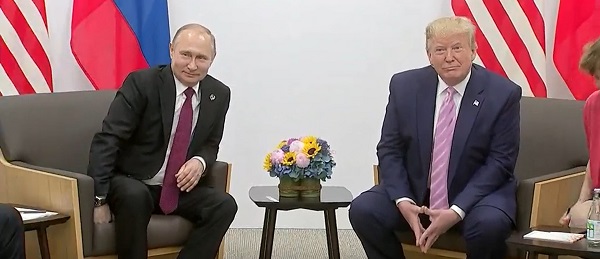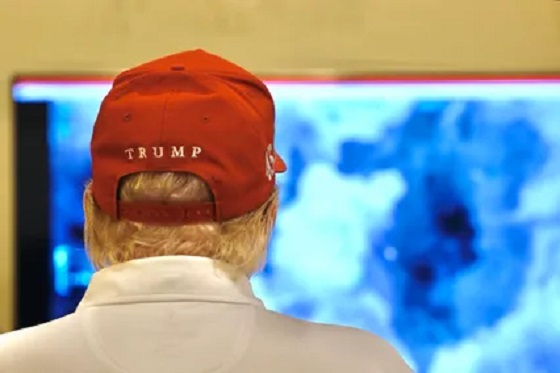conflict
Trump Brings Glimmer Of Hope For Peace In Europe


From the Daily Caller News Foundation
By Morgan Murphy
As the war in Ukraine rages onward, President-elect Donald Trump brings a glimmer of hope for peace in Europe this Christmas season.
An end to the fighting hinges on three key points: (1) Crimea (2) the Donbas region east of the Dnieper River and (3) NATO membership for Ukraine. Many more issues lurk, but without agreement on these major negotiating points, it is unlikely a peace deal will emerge.
Wars often begin with wild optimism that leads to untenable positions. In 1860, Confederates imagined a “short war,” and after early successes at Fort Sumter and Bull Run thought they would be marching through Philadelphia in a matter of months. In 1941, the Japanese strategized they could knock out the U.S. Pacific fleet, shocking and demoralizing the American public long enough for Japan to consolidate their “Greater East Asia Co-Prosperity Sphere,” capitalizing on resource-rich territories like Southeast Asia, the Dutch East Indies and the Philippines. In both cases, initial optimism led to eventual disaster.
In 2022, Russian President Vladimir Putin’s aimed to seize Kiev and roll over the rest of Ukraine. U.S. intelligence agencies predicted he would be successful. Similarly, after an unexpectedly strong defense, Ukrainian president Volodymyr Zelenskyy vowed to reclaim every inch of land occupied by Russia. Until as recently as this fall, he was touting a “victory plan” to force Moscow to surrender.
Yet, as it tends to do in conflict, the specter of death clarifies the mind. One thousand days of bloodshed in Eastern Europe has washed away initial optimism, giving way to grim realism on both sides. With the war approaching its third year, the biggest recent change in the dynamic is Trump’s landslide election in November.
In a word, Trump’s victory crushed any hopes that America might come charging into the war with air cover and boots on the ground. Out too, are further multi-billion “supplemental Ukraine spending packages.” The American people resoundingly voted to shrink government and cut off the firehose of taxpayer dollars spewing out of Washington, D.C.
Last Wednesday, Trump named Lt. Gen. Keith Kellogg as the special envoy to Russia and Ukraine. In the announcement, Trump said of Kellogg, “He was with me right from the beginning! Together, we will secure PEACE THROUGH STRENGTH, and Make America, and the World, SAFE AGAIN!” The battle-hardened warrior and former Fox News analyst (and full disclosure — my boss and colleague at the America First Policy Institute) will no doubt bring massive pressure to bear on both sides.
After the election, it did not take long for all parties to adjust to the new reality. Putin said what Trump publicly said “about the desire to restore relations with Russia, to help end the Ukrainian crisis, in my opinion, deserves attention at least.” Last week, Zelenskyy soberly admitted to Sky News that Ukraine would surrender Crimea, Russia’s critical entry point to the Black Sea.
“He’s been saying that quietly for more than a year,” another prominent Ukrainian politician told me privately this week.
Likewise, European leaders are quietly discussing the most likely scenario: Russia keeps Crimea and the Russian-centric provinces of Donetsk and Luhansk. Speaking off the record with several former Senate colleagues, the mood seems the same in Washington.
That leaves, of course, the issue of NATO membership for Ukraine. President Joe Biden and his senior-most cabinet membersr loudly and repeatedly promised NATO membership for Ukraine. The problem with that promise was their resounding defeat. The American people feel great sympathy for Ukraine, but that stops short of committing the lives of our youth to defend Ukraine’s borders.
Since at least 2007, Putin has made clear that NATO membership for Ukraine and Georgia are non-negotiable for Russia. Though many Western leaders seem to doubt his resolve, Putin has more than backed up his red line with 700,000 Russian casualties. More American jets or long-range missiles are unlikely to change Putin’s calculus.
Short of NATO membership, perhaps we will see a U.N. peacekeeping mission similar to the armistice on the Korean Peninsula in 1953. Ukrainian membership in the European Union may be in the offing as well.
Either way, a new American president and seeming willingness on both sides to negotiate brings with it the hope of peace in the new year.
Morgan Murphy is military thought leader, former press secretary to the Secretary of Defense and national security advisor in the U.S. Senate.
conflict
Zelensky Alleges Chinese Nationals Fighting for Russia, Calls for Global Response

 Sam Cooper
Sam Cooper
Ukrainian President Volodymyr Zelensky announced Tuesday that his forces have captured two Chinese citizens fighting as part of the Russian army in eastern Ukraine, alleging “there are many more Chinese citizens in the occupier’s units.” The stunning revelation could inject a volatile new dimension into ceasefire negotiations between the United States and Russia—and intensify already fraught tensions over Taiwan.
Zelensky shared the news in an X post, accompanied by video of one of the captured men—an Asian male in beige fatigues, hands bound with zip ties, visibly distressed as he gestures to a Ukrainian camera operator. The video shows the man making whirring sounds, crouching instinctively as if a drone is circling above and opening fire—then glancing up and uttering the English word, “commander.”
“We have information suggesting that there are many more Chinese citizens in the occupier’s units than just these two,” Zelensky wrote on X. “We are currently verifying all the facts—intelligence, the Security Service of Ukraine, and the relevant units of the Armed Forces are working on it.”
The president said he has instructed Ukraine’s foreign minister to urgently contact Beijing to clarify how China intends to respond.
“Russia’s involvement of China, along with other countries, whether directly or indirectly, in this war in Europe is a clear signal that Putin intends to do anything but end the war,” Zelensky wrote. “He is looking for ways to continue fighting. This definitely requires a response. A response from the United States, Europe, and all those around the world who want peace.”
Zelensky added that Ukrainian authorities had recovered documents, bank cards, and personal data from the two prisoners—material that could be pivotal in discovering the nature of China’s involvement.
If verified, the presence of Chinese nationals fighting for Russia could carry sweeping geopolitical implications. It would complicate delicate U.S.-Russia negotiations aimed at exploring a conditional ceasefire, and could have indirect ramifications on the plans of Washington, Tokyo, and Taipei in their growing confrontation with Beijing.
China has repeatedly denied providing direct military support to Russia. Zelensky’s statement marks the first time Ukraine has publicly alleged that Chinese nationals are embedded in Russian combat units—an allegation that, if substantiated, could alter the strategic calculus in both Eastern Europe and the Indo-Pacific.
Responding to Zelensky’s claims, Tom Shugart, a senior defense analyst at the Center for a New American Security and a former U.S. Navy officer, emphasized that the strategic implications hinge on whether the Chinese nationals were acting as mercenaries or state-directed personnel. “If the PRC is actively providing soldiers to fight in Ukraine, that would be altogether different—a possible sign of a real Axis that may best be resisted wherever it is fighting,” he wrote on X.
This is a developing story. The Bureau will continue to report as further details emerge.

Recommend The Bureau to your readers
conflict
“HELL WILL RAIN DOWN”: Trump unleashes U.S. military on Yemeni Houthis

 MxM News
MxM News
Quick Hit:
President Trump ordered a massive military assault on Iranian-backed Houthi forces in Yemen on Saturday, vowing to unleash “overwhelming lethal force” after months of attacks on American and allied vessels in the Red Sea.
Key Details:
-
Trump announced the strikes in a Truth Social post, stating, “Today, I have ordered the United States Military to launch decisive and powerful Military action against the Houthi terrorists in Yemen.”
-
He criticized former President Joe Biden for failing to contain the Houthis, saying his response was “pathetically weak” and emboldened the group’s ongoing attacks on commercial and military vessels.
-
The U.S. Navy’s USS Harry S. Truman carrier strike group, along with three destroyers and a cruiser, launched the assault, targeting radars, air defenses, and missile systems used to disrupt shipping lanes.
CENTCOM Forces Launch Large Scale Operation Against Iran-Backed Houthis in Yemen
On March 15, U.S. Central Command initiated a series of operations consisting of precision strikes against Iran-backed Houthi targets across Yemen to defend American interests, deter enemies, and… pic.twitter.com/u5yx8WneoG
— U.S. Central Command (@CENTCOM) March 15, 2025
Diving Deeper:
President Trump escalated U.S. military action against Iran-backed Houthi rebels on Saturday, ordering airstrikes on targets in Yemen in response to the group’s repeated attacks on Red Sea shipping. Trump, in a Truth Social post, declared that the U.S. military would not tolerate continued aggression and vowed an overwhelming response.
“The Houthi attack on American vessels will not be tolerated,” Trump wrote. “We will use overwhelming lethal force until we have achieved our objective.” He directly warned the Houthis, stating, “YOUR TIME IS UP, AND YOUR ATTACKS MUST STOP, STARTING TODAY. IF THEY DON’T, HELL WILL RAIN DOWN UPON YOU LIKE NOTHING YOU HAVE EVER SEEN BEFORE!”
The strikes, carried out by U.S. Central Command, targeted missile sites, drone launch facilities, and command centers used by the Houthis to strike commercial and military vessels in the Red Sea. U.S. warships and carrier-based fighter jets participated in the mission, marking a significant escalation in efforts to protect international shipping routes.
Trump also issued a direct warning to Iran, demanding that its support for the Houthis “must end immediately.” Addressing Tehran, Trump wrote, “Do NOT threaten the American People, their President…or Worldwide shipping lanes. If you do, BEWARE, because America will hold you fully accountable and we won’t be nice about it!”
The strikes come after more than a year of escalating attacks by the Houthis, who have targeted over 100 merchant vessels, sunk at least two, and killed multiple sailors since the Israel-Hamas war began. Trump pointed to Biden’s failures in handling the crisis, noting that “it has been over a year since a U.S.-flagged commercial ship safely sailed through the Suez Canal, the Red Sea, or the Gulf of Aden.”
With Trump’s order, the U.S. is making clear that hostile actions in the Red Sea will not go unanswered. As military operations continue, all eyes will be on whether the Houthis and their Iranian backers heed the warning—or face even greater firepower from the U.S. military.
-

 International2 days ago
International2 days agoPope Francis Dies on Day after Easter
-

 International2 days ago
International2 days agoJD Vance was one of the last people to meet Pope Francis
-

 2025 Federal Election1 day ago
2025 Federal Election1 day agoOttawa Confirms China interfering with 2025 federal election: Beijing Seeks to Block Joe Tay’s Election
-

 COVID-191 day ago
COVID-191 day agoNearly Half of “COVID-19 Deaths” Were Not Due to COVID-19 – Scientific Reports Journal
-

 2025 Federal Election1 day ago
2025 Federal Election1 day agoHow Canada’s Mainstream Media Lost the Public Trust
-

 2025 Federal Election23 hours ago
2025 Federal Election23 hours agoBREAKING: THE FEDERAL BRIEF THAT SHOULD SINK CARNEY
-

 Media21 hours ago
Media21 hours agoCBC retracts false claims about residential schools after accusing Rebel News of ‘misinformation’
-

 2025 Federal Election1 day ago
2025 Federal Election1 day agoReal Homes vs. Modular Shoeboxes: The Housing Battle Between Poilievre and Carney







